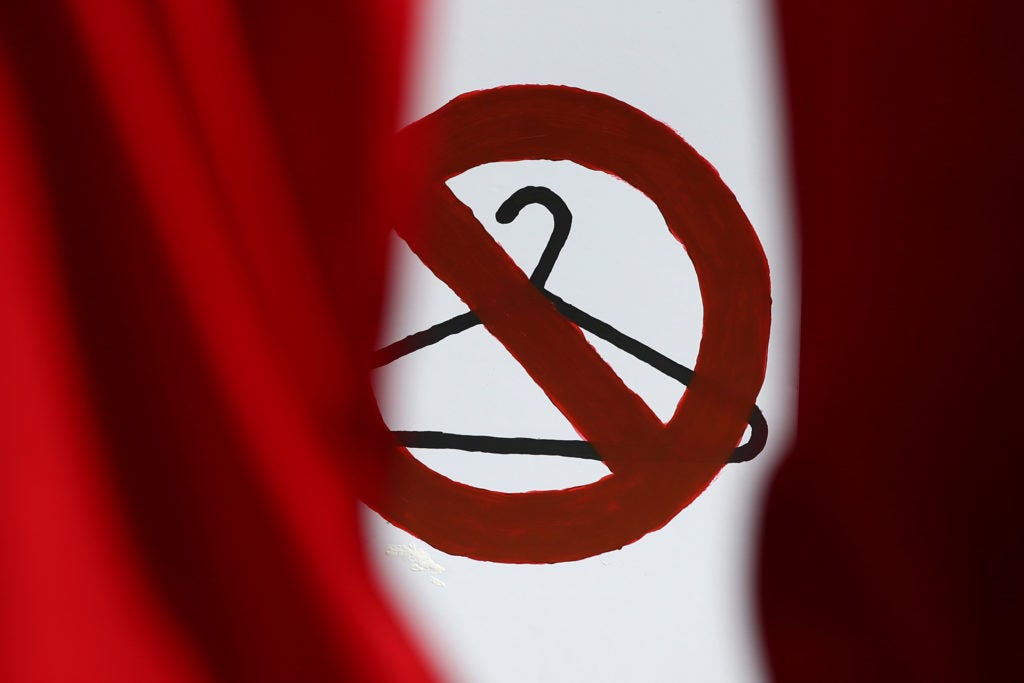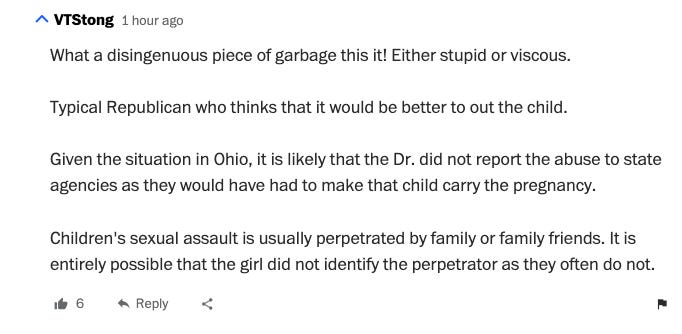A pro-choice placard at a protest for the protection of abortion rights outside the U.S. Embassy on May 7, 2022 in London, England. (Photo by Hollie Adams/Getty Images)(Happy Sunday! Once again, Cathy Young takes over the Sunday Morning Shots.) The story of the 10-year-old pregnant rape victim in Ohio who had to travel to Indiana to get an abortion because she was three days past Ohio’s six-week cutoff point for legal abortion, reported in the Indianapolis Star on July 1, quickly went viral as a shocking example of the barbarism descending on the nation because of the Supreme Court’s decision to overturn Roe v. Wade. It struck even many people with pro-life sympathies as an example of anti-abortion extremism. On July 8, President Biden mentioned it when signing an executive order on abortion access. The question is: Did it really happen? Washington Post fact-checker Glenn Kessler casts strong doubt on the story’s authenticity in an article published on Saturday, calling it “the account of a one-source story that quickly went viral around the world—and into the talking points of the president.” Kessler notes that the harrowing tale appeared as the opening of a story about women from Ohio traveling to other states to get abortions.
The fact-checking website Snopes.com also says that they were unable to get any corroborating information and that Bernard did not respond to their query. At this point, I’m leaning strongly toward “probably didn’t happen.” Pregnancy in a 10-year-old is certainly not impossible (earlier this year, a 10-year-old in Brazil was initially denied an abortion because it was sought past the 22-week cutoff point), but it is extremely rare. (Kessler notes that 52 girls under the age of 15 got abortions in Ohio in 2020; but “under 15” is not the same as 10.) It also seems likely, as some doubters of the story have noted, that a pregnant 10-year-old would have also qualified for the life or health exemption written into Ohio’s law banning abortions beyond six weeks. The law states that the ban
In raising these reasonable questions about the Ohio story, Kessler was doing basic journalism. But—in a development that will surprise exactly no one—a lot of readers in the comments under his article have reacted by making him the bad guy: Other comments have been along the lines of it’s irrelevant whether this is true, the important thing is that it could have happened. Sorry, folks. I’m all in favor of mobilizing public opinion on the side of abortion rights. But remember when we were all against disinformation? You can’t be against disinformation and take an “it doesn’t matter whether this is true if it helps our side” position. Otherwise, we’re in “Muslims dancing on the roof to celebrate the fall of the Twin Towers” territory. And “it could have happened” is not a good argument, either. In all the post-Dobbs chaos, as people in states with new or newly reactivated abortion-restricting laws try to figure out what’s legal and what may not be, it’s especially important to stick to the facts—not only for the sake of the integrity of the news media and the importance of truth for our democracy, but because sowing unnecessary panic among women is not justified by the goal of drumming up more support for abortion rights and/or for the Democrats. (And I say this as someone who, at this moment, wants Republicans to lose, not only because of reproductive rights issues but because of the general abysmal state of the party.) There have been, for instance, a lot of reports on Twitter claiming that doctors in states with abortion bans or restrictions are refusing to prescribe certain drugs that could be seen as potential abortifacients not only to pregnant women, but to all women of childbearing age—even when those drugs are medically necessary. Completely outrageous if true, but again: Is it true? A Time magazine story on these reports cites the experience of a Tennessee woman with arthritis who says “she got an automated call from her pharmacy saying her methotrexate refill for the month hadn’t been approved.” (The drug is sometimes prescribed to induce abortions, but according to the BMJ it “is also approved for the treatment of rheumatoid arthritis, lupus, and cancer.”) The woman “eventually did get her medication after her doctor re-processed the refill request,” and neither the pharmacy nor the doctor have said that the abortion issue affected her prescription; she simply “feels the timing is suspicious.” But refills for all sorts of medicines sometimes get denied because of glitches. Time notes that states with abortion medication bans specifically exempt non-abortion-related uses of those drugs (though one could still imagine doctors being skittish) and that evidence of denials is anecdotal. Let’s stick to the facts. Meanwhile on the pro-life right: calls to #ResistA recent piece by Federalist senior contributor and podcaster Georgi Boorman sets a new record for crazy, even by the standards of that nutty outlet. It’s titled “Pro-Lifers Should Never Have Tolerated Unconstitutional Roe, And Must Never Do So Again.” (“Again” because Boorman believes, not unreasonably, that a future, more liberal Supreme Court may reinstate the constitutional right to abortion.) Boorman thinks that abortion opponents’ long-term strategy of capturing a Supreme Court majority to overturn Roe v. Wade allowed “63 million preborn lives [to be] snuffed out.” I don’t dismiss the views of those who regard all abortion as murder, and I understand that this is a horrific toll from their point of view. But what exactly does Boorman envision as the alternative? Boorman talks about attempts to pass a Human Life Amendment (some versions of which would have outlawed abortion by explicitly making the equal standing of fetuses a part of the Constitution), but acknowledges that they have failed. The fact is that the constituency for such an amendment did not and does not exist. Boorman’s argument seems to be simply that states with anti-abortion legislation should have said, Screw the Supreme Court! Or, as she more elegantly puts it, “we must consider the hazards of holding the Supreme Court as the final arbiters of constitutionality, particularly when matters of life, death, and bodily autonomy are at stake.” Her analogy:
Setting aside the fact that the history of what happened in the states and at the federal level with regard to marijuana legalization is a lot more complicated than Boorman suggests, her analogy falls apart because the DEA is not the Supreme Court: There’s also a big difference between the federal government declining to arrest people for an activity that is legal in their states but not under federal law, and the federal government allowing states to shut down clinics or prosecute people for exercising a right upheld by the Supreme Court. What’s more, no one was contesting the feds’ non-enforcement of marijuana laws; if a Republican administration had refused to enforce federal law with regard to abortion in deference to state law, those actions would have promptly led to court battles. In other words: One of these things is not like the other. The bottom line: No, you can’t just ignore the law of the land, unless you want anarchy, a constitutional crisis, and possibly clashes between federal marshals and local police. (Maybe Boorman believes that protecting unborn lives is worth the risk of such consequences; but if so, she gives no indication that she even understands the risk exists.) This way madness lies. A few more words on Russia and Ukraine—and JewsIn my last Morning Shots newsletter, I wrote about losing (at least in the eyes of a hardcore libertarian audience) a Russia/Ukraine debate with antiwar radio talk show host Scott Horton, whose opposition to U.S. support for Ukraine takes the form of recycling every Kremlin talking point about the “neo-Nazi junta” in Kyiv and the evil American machinations behind Ukraine’s quest for independence from Russia. That debate is now online, so, see for yourselves:  I know it’s a bit lame to Monday-morning-quarterback one’s own debates, but two additional points I should have made. 1. Russia repeatedly violated the 2015 Minsk agreements, which Horton mentioned as something the United States should have insisted on Ukraine observing. As American diplomat Kurt Volker noted last December:
Volker also notes that “Ukraine has implemented as much of Minsk as can reasonably be done while Russia still occupies its territory.” 2. The obscene labeling of the Ukrainian government as a “neo-Nazi junta” ignores not only the fact that it is currently headed by a Jewish president—and previously had a Jewish prime minister—but the fact that it has had, from the start of the 2014 “Revolution of Dignity,” the strong and overwhelming support of the Ukrainian Jewish community. There is something extremely unsavory about suggesting that Jews support Nazis. You’re a free subscriber to Morning Shots. For the full experience, become a paid subscriber. |




